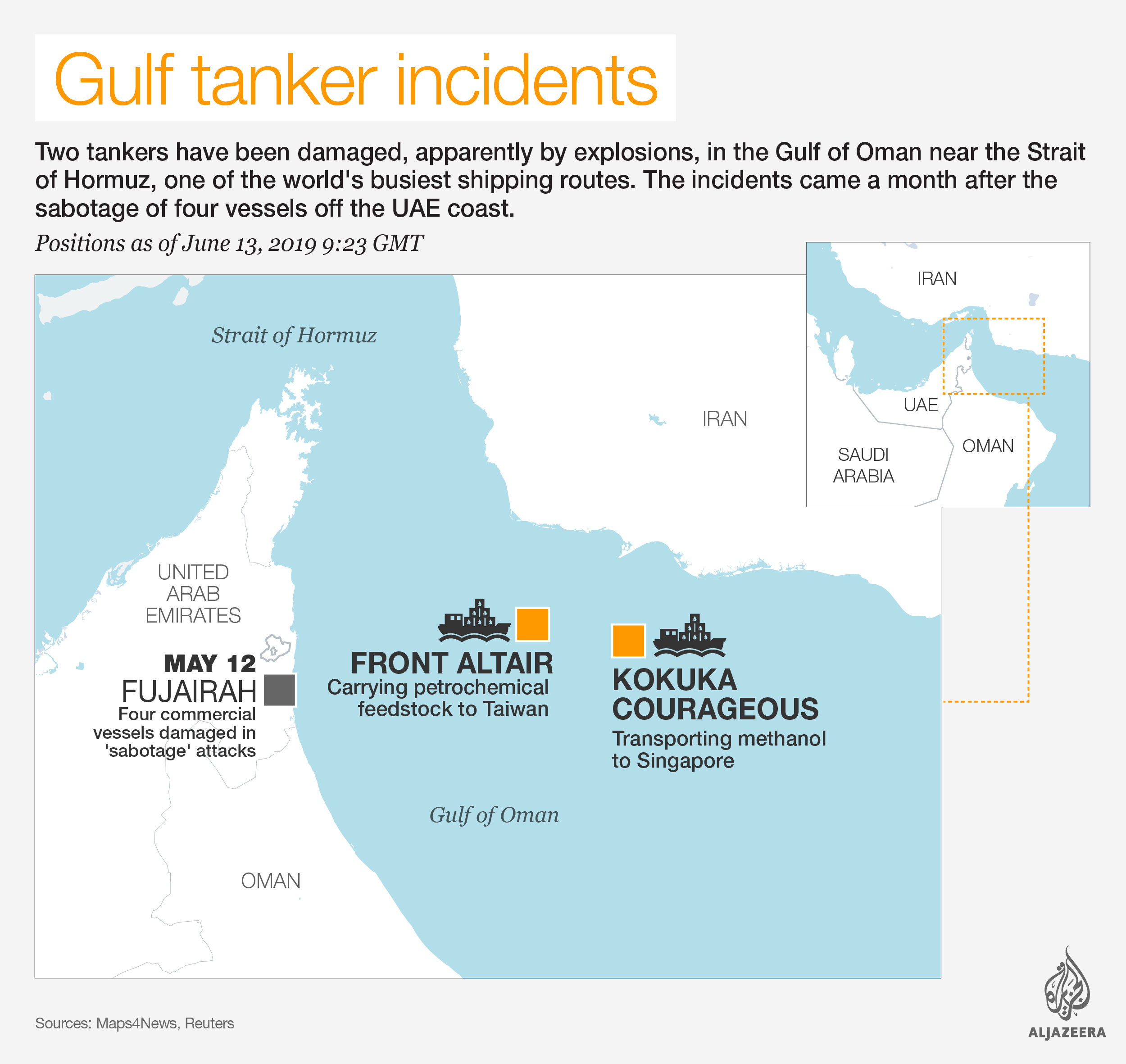The United States has blamed Iran for the attacks, but Tehran has denied any role in the incidents and called the accusations „ridiculous“ and „dangerous“.
Saudi Energy Minister Khalid al-Falih on Saturday said „there must be a rapid and decisive response to the threat“ to energy supplies, market stability and consumer confidence after the attacks in the Gulf area, the Saudi Energy Ministry reported on Twitter.
The United Arab Emirates (UAE) also called for world powers on Saturday to help secure maritime traffic and energy supplies.
„The international community must cooperate to secure international navigation and access to energy,“ UAE Foreign Minister Sheikh Abdullah bin Zayed Al Nahyan said at a summit in Bulgaria.
On Friday, the US released a grainy video it claimed showed Iran’s military removing an unexploded mine from one of the tankers, Kokuka Courageous, hours after the suspected attacks.
„The more information that we can declassify, the more information we can share, we will. And that’s our intent,“ Shanahan said.
The release of the black-and-white footage came after Secretary of State Mike Pompeo said US intelligence agencies had concluded that Iran was responsible for the attacks, without offering concrete evidence.
On Friday, in a TV interview on Fox News, Trump said, „Iran did do it“.
„You know they did it because you saw the boat,“ Trump told the Fox and Friends show. „I guess one of the mines didn’t explode and it’s probably got essentially Iran written all over it.“
Calling reports of a mine attack „false“, he said: „The crew was saying it was hit by a flying object … To put a bomb at the side of the boat is not something we are considering.“
For its part, Iran rejected the accusations as the United Nations, Russia and Qatar called for an international investigation into the reported attacks.
Mohammad Javad Zarif, Iran’s foreign minister, said the US had „immediately jumped to make allegations against Iran without a shred of factual or circumstantial evidence“.
The allegation „only makes it abundantly clear“ that the US and its regional allies, Saudi Arabia and the United Arab Emirates, were moving to a „Plan B“, Zarif said, which was to „sabotage diplomacy“ as Japanese Prime Minister Shinzo Abe visited Iran to defuse escalating US-Iran frictions.
The director general of ports and maritime affairs of Iran’s Hormozgan province told Iran’s student-run ISNA news agency on Saturday that no marine pollution was detected after the tanker explosions.
The 23 seamen of the second tanker, Front Altair, who were rescued and brought to Bandar Abbas, arrived in Dubai on Saturday, according to the ship’s owners and managers.
The other tanker, the Kokuka Courageous with 21 crew on board, arrived on Friday in the port of Khor Fakkan in the UAE, ISNA reported.
Arab League caution
Secretary-General Ahmed Aboul Gheit noted, after meeting with UN Secretary-General Antonio Guterres at UN headquarters in New York, that there are conflicting reports about how Thursday’s tanker incidents occurred.
„We believe that responsibilities need to be clearly defined,“ he said. „The facts will be revealed, I am sure, it’s only a matter of time.“
Aboul Gheit added „My call to my Iranian – and I call them Iranian brothers: Be careful and reverse course because you’re pushing everybody towards a confrontation that no one would be safe if it happens.“
The British government said it agreed with the US conclusion that Iran attacked the tankers.
The Foreign Office said in a statement that its own assessment concluded „it is almost certain that a branch of the Iranian military,“ the Islamic Revolutionary Guard Corps, had attacked the tankers.
It said it also believed Iran was behind an attack last month on four tankers near the UAE port of Fujairah.
On May 12, days after Washington announced the military deployment, four oil tankers near the port were damaged in what the UAE called „sabotage attacks“.
The Iranian Foreign Ministry called in British Ambassador Rob Macaire on Saturday to submit „a few explanations,“ state news agency IRNA reported, without giving further details.
Nuclear deal compliance
Separately, the Iranian president on Saturday told a meeting of Russian, Chinese and other Asian leaders in Tajikistan that Iran will continue scaling back compliance with its commitments under the nuclear deal unless other signatories show „positive signals“.
Iran stopped complying in May with some commitments in a 2015 nuclear deal that was agreed with global powers, a year after the United States unilaterally withdrew from the accord and tightened sanctions.
Tehran said in May that Iran would start enriching uranium at a higher level unless world powers protected its economy from US sanctions within 60 days.
„Obviously, Iran cannot stick to this agreement unilaterally,“ President Hassan Rouhani told the Conference on Interaction and Confidence Building Measures in Asia.
„It is necessary that all the sides of this agreement contribute to restoring it,“ he said, adding that Iran needed to see „positive signals“ from other signatories to the pact, which include Russia, China, Britain, France and Germany.
He did not give details on what actions Iran would take or say what positive signals Tehran wanted to see.
France and other European signatories to the deal, which aimed to curb Iran’s nuclear ambitions, have said they wanted to save it, but many of their companies have cancelled deals with Tehran under financial pressure from the US.
Western powers have accused Iran of seeking to develop nuclear weapons, a charge Tehran denies, saying it wants nuclear technology for peaceful purposes.
![Saudi Arabia calls for 'decisive' action over tanker attacks The crude oil tanker Front Altair on fire in the Gulf of Oman after Thursday's attack [File: EPA]](https://www.aljazeera.com/mritems/imagecache/mbdxxlarge/mritems/Images/2019/6/15/c0ac87819f0b45d9877a64697719540c_18.jpg)

No comments:
Post a Comment